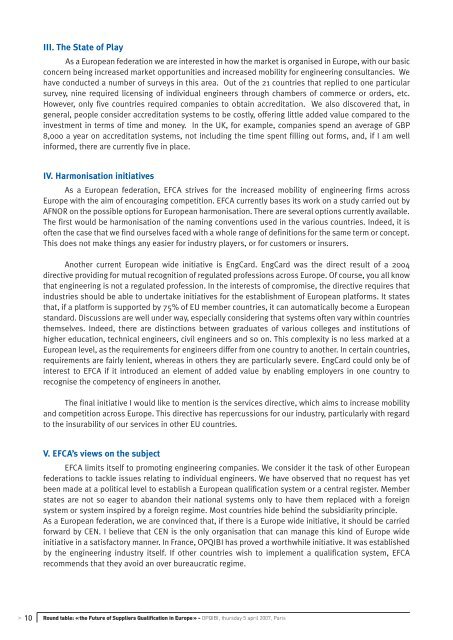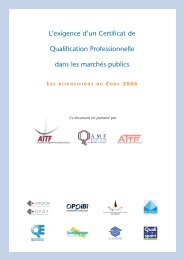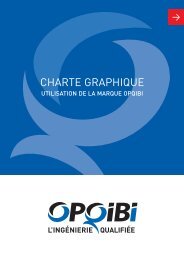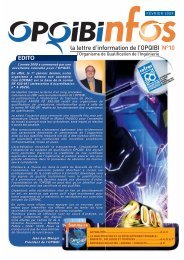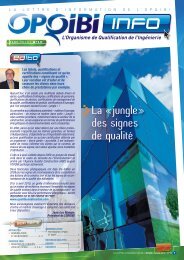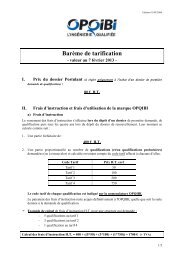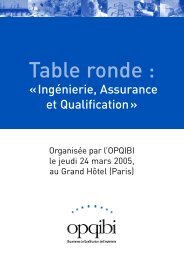Round table - Opqibi
Round table - Opqibi
Round table - Opqibi
Create successful ePaper yourself
Turn your PDF publications into a flip-book with our unique Google optimized e-Paper software.
III. The State of Play<br />
As a European federation we are interested in how the market is organised in Europe, with our basic<br />
concern being increased market opportunities and increased mobility for engineering consultancies. We<br />
have conducted a number of surveys in this area. Out of the 21 countries that replied to one particular<br />
survey, nine required licensing of individual engineers through chambers of commerce or orders, etc.<br />
However, only five countries required companies to obtain accreditation. We also discovered that, in<br />
general, people consider accreditation systems to be costly, offering little added value compared to the<br />
investment in terms of time and money. In the UK, for example, companies spend an average of GBP<br />
8,000 a year on accreditation systems, not including the time spent filling out forms, and, if I am well<br />
informed, there are currently five in place.<br />
IV. Harmonisation initiatives<br />
As a European federation, EFCA strives for the increased mobility of engineering firms across<br />
Europe with the aim of encouraging competition. EFCA currently bases its work on a study carried out by<br />
AFNOR on the possible options for European harmonisation. There are several options currently available.<br />
The first would be harmonisation of the naming conventions used in the various countries. Indeed, it is<br />
often the case that we find ourselves faced with a whole range of definitions for the same term or concept.<br />
This does not make things any easier for industry players, or for customers or insurers.<br />
Another current European wide initiative is EngCard. EngCard was the direct result of a 2004<br />
directive providing for mutual recognition of regulated professions across Europe. Of course, you all know<br />
that engineering is not a regulated profession. In the interests of compromise, the directive requires that<br />
industries should be able to undertake initiatives for the establishment of European platforms. It states<br />
that, if a platform is supported by 75% of EU member countries, it can automatically become a European<br />
standard. Discussions are well under way, especially considering that systems often vary within countries<br />
themselves. Indeed, there are distinctions between graduates of various colleges and institutions of<br />
higher education, technical engineers, civil engineers and so on. This complexity is no less marked at a<br />
European level, as the requirements for engineers differ from one country to another. In certain countries,<br />
requirements are fairly lenient, whereas in others they are particularly severe. EngCard could only be of<br />
interest to EFCA if it introduced an element of added value by enabling employers in one country to<br />
recognise the competency of engineers in another.<br />
The final initiative I would like to mention is the services directive, which aims to increase mobility<br />
and competition across Europe. This directive has repercussions for our industry, particularly with regard<br />
to the insurability of our services in other EU countries.<br />
V. EFCA’s views on the subject<br />
EFCA limits itself to promoting engineering companies. We consider it the task of other European<br />
federations to tackle issues relating to individual engineers. We have observed that no request has yet<br />
been made at a political level to establish a European qualification system or a central register. Member<br />
states are not so eager to abandon their national systems only to have them replaced with a foreign<br />
system or system inspired by a foreign regime. Most countries hide behind the subsidiarity principle.<br />
As a European federation, we are convinced that, if there is a Europe wide initiative, it should be carried<br />
forward by CEN. I believe that CEN is the only organisation that can manage this kind of Europe wide<br />
initiative in a satisfactory manner. In France, OPQIBI has proved a worthwhile initiative. It was established<br />
by the engineering industry itself. If other countries wish to implement a qualification system, EFCA<br />
recommends that they avoid an over bureaucratic regime.<br />
> 10 <strong>Round</strong> <strong>table</strong>: « the Future of Suppliers Qualification in Europe » - OPQIBI, thursday 5 april 2007, Paris


